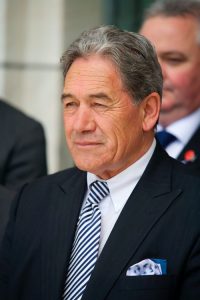Jacinda Ardern was expected to win the latest election. But the comprehensive scale of the Labour Party leader’s defeat of National caught most observers by surprise.
New Zealand’s political landscape has been upended. Labour has an overwhelming majority, and can now govern alone for the next three years.
Given Labour has not been noted for its assertive or effective implementation of policy for most of its coalition government’s term, it will be interesting to see what happens next.

What the Bay needs, say business leaders, is prompt action to remedy the problems of the RMA that slow down development, to get affordable housing built, and quickly get major infrastructure and roading projects under way.
There will be no tolerance from the electorate next time around for non-performance if Labour fails to deliver, given the powerful position it now holds.
Humbling result for National
The National Party has been, in the words of Western Bay MP Todd Muller, “humbled” by its defeat. “It was a pretty sobering night,” he said. As for his own role in that defeat, Muller has acknowledged that his own rolling of fellow Bay MP Simon Bridges played a part in the party’s failure at the polls.
But of course, neither Muller nor eventual election leader Judith Collins would have been able to take their turns as leader had National been in better shape.

The party is now preoccupied in intensely reading their own and the electorate’s entrails for clues on how they can win back power.
ACT leader David Seymour was clearly one of the election’s winners, bringing in a healthy 10 MPs to join him in what had been a solitary role in parliament.

Unlikely as it may sound, unless National gets itself together, ACT may continue to erode its support partner’s centre right/free enterprise slice of the New Zealand electorate.
It can be argued that Seymour made a more compelling series of arguments for the centre-right position during the election campaign than National.
There is a strong view that a number of National supporters held their nose, voted for their National MP, and gave their party vote to Labour simply to keep the Green Party from having leverage.
Anecdotally, I can vouch for several examples of this strategy. As one business leader remarked, all of business would have been much keener to have a solely Labour government than one with the Greens – not that they disagree with their environmental positions, but because of their economic positions, such as the wealth tax.
“Stability is a big thing for business,” he said.
As this was written, there were still ongoing negotiations between the government and the Greens, but whether they finish up inside or outside cabinet, the reality is that their ability to influence policy is diminished despite their healthy share of the vote.
What the Bay needs… is prompt action to remedy the problems of the RMA that slow down development, to get affordable housing built, and quickly get major infrastructure and roading projects under way. There will be no tolerance from the electorate next time around for non-performance if Labour fails to deliver, given the powerful position it now holds.” – David Porter
While it would be nice for Green Party co-pleaders to get their feet under the cabinet table or near it, they would seem to run as much risk of alienating some of their core supporters by doing so, rather than by standing alone on the cross benches, albeit in support.

Overcoming first-term failures
The basic issue that the Labour Government now confronts may be in meeting an excess of expectations.
A self-described “pragmatic idealist” Ardern largely failed to control the forces within her coalition in the previous term.
Campaign promises were not met, the capital gains tax was quietly buried, the 100,000 new houses were not built, child poverty was not improved. This could partly be blamed on warring coalition partners.
Despite New Zealand’s relative success in dealing with Covid-19, it is fair to say that we have been lucky in being isolated and blessed with a relatively clear set of communications from the government – as well as a generally well-behaved and mostly sparsely distributed population.
That said, the lockdowns have been riddled with inconsistencies and the tracking and border controls have exposed some serious flaws that still need improvement.

NZ First gloried in its role as the “handbrake” of common sense in the outgoing coalition.
Those days are gone. It has always been the Winston Peters’ party and now it seems unlikely in the extreme that either the party or its leader will be back to fight another day, despite his many fans and undeniable shrewdness.
Even Shane Jones’ last-minute doling out of Provincial Growth Fund election baubles in the frantic run-up to the election wasn’t enough to get the party over the electoral threshold.
So there will be no handbrake to blame for any mis-steps in the current term of the new government.
Nobody can take away from Ardern the fact that she is perceived by most as a highly empathic politician and is an excellent communicator. Those qualities have shone through during our recent disasters.
It certainly helped Labour’s election prospects that Ardern was able to run a virtually free daily election broadcast throughout Covid-19’s onset and its various lockdowns.
But she undoubtedly has a likeable quality the electorate responded to – and without that any politician is doomed.
The problem facing National, is replacing Collins. She inherited a poor hand prior to the elections, but it seems unlikely that she will survive as opposition leader.
Fixing the RMA and housing
Priority One chief executive Nigel Tutt says one of the biggest issues the new government needs to deal with is fixing housing, via the Resource Management Act (RMA).
Tauranga had New Zealand’s highest rising population growth in the June quarter this year, but the lack of developable industrial land, and rising house prices are constraining growth. Development risks need to be reduced, he said.
“There are more people moving here,” he said.
“Working from home and more flexible working arrangements helped. I think we’ll see business continue to want to move here on the strength of the port and the fact that the Bay is a growing region.”
Priority One was getting a lot of enquiries both domestically and from overseas, he said.
“I don’t think that’s going to ease off at all. But we want growth at the right speed. And if we can’t get hold of talent or the economy can’t cope with the rising cost of living, then businesses are going to be placed in a very difficult position,” he said.
“That’s what [the government] needs to deliver on in the next three years.”
The other main issue, of course, said Tutt, will be for the government to ensure that it invests wisely for economic stimulus and gains, in a Covid-9 infected world.
“We want growth at the right speed. And if we can’t get hold of talent or the economy can’t cope with the rising cost of living, then businesses are going to be placed in a very difficult position. That’s what [the government] needs to deliver on in the next three years.” – Nigel Tutt
Infrastructure development was key, particularly in infrastructure with roading as a key component. The government needed a good regional plan to make sure that happens.
“They have that now and partnered really with the region in the last year or so, so that will help immeasurably, particularly for local business in terms of improving productivity.”
New Zealand and the Bay in particular, had been lucky so far that Covid-19 hadn’t had more of an effect on the economy.
“We’ve been lucky our trading partners have been relatively unaffected,” he said. “It’s now about how we grow well from here.”

Getting Kiwis into jobs
Matt Cowley, chief executive of the Tauranga Chamber of Commerce, told Bay of Plenty Business News that the number one issue of the election – other than managing Covid-19 – was the economic recovery and getting Kiwis into jobs.
“Labour being Labour, they have a number of employment relations initiatives to run through,” he said.
“That was their election campaign [platform], they’ve got no one else they really need to negotiate with, so they’ve got the numbers and they’ll be able to deliver it.”
Cowley said business’ goal was that government work with the industry and employer organisations to roll out those changes in a pragmatic fashion, he said.
“There are greater costs going to be put on to business to employ staff and I’m sure a number of business will accept that,” he said.
“But to help achieve the broader goal of keeping Kiwis employed, a great way would be to reinstate that 90-day trial across all business so that people can have an opportunity to prove themselves,” he said.
Before they commit to taking on the costs of full employment they need to be a bit more risk- averse until they’re sure that is a good business decision, said Cowley.
Those are the businesses that can employ a number of the Kiwis that Labour wants to be employed,” he said. “The government should work with business on a plan to develop that and not make it so cost prohibitive they are then looking for alternatives to employing local staff.” – Matt Cowley
The most vulnerable business on the back of Covid-19 have been sectors such as hospitality, tourism and the construction sector, with generally low skilled labour.
“Those are the businesses that can employ a number of the Kiwis that Labour wants to be employed,” he said. “The government should work with business on a plan to develop that and not make it so cost prohibitive they are then looking for alternatives to employing local staff – whether it’s outsourcing to other countries or whatever way.”
Problems of moving on and off benefits
As noted in our story on the kiwifruit employment sector, replacing the seasonal workers that are no longer allowed to enter the country, is causing major problems for the sector.
We are lucky to live in a country where we get a chance to have a say on who runs the country, every three years. The Labour Government must be congratulated and it has been handed a strong mandate to deliver its policies without the impediment of any governing partners, so that helps with stability and confidence.” – Bryce Heard
The problem is that offering someone who may have taken some weeks of bureaucratic wrangling to get onto a benefit, a relatively short term, physically demanding job at a low hourly rate in a location away from home, is unlikely to be very attractive.
Especially if they then have to go through the same bureaucratic hurdles to get back onto their benefit again.
Priority One’s Nigel Tutt suggested the government needed to find a more pragmatic approach to solve that problem, whether it was some kind of way that allowed beneficiaries to easily move from benefit to taking the seasonal option.
“The reality is that [horticultural work]is going to be quite a constrained workforce,” he said.
“Ultimately if we are constrained for workers, businesses will need to throw everything at automating as well and it won’t be a one-year fix.”
Todd Muller, whose family and business background is in horticulture and the dairy industry, said that from his personal perspective Labour did not really understand the reality of building a business.
“There are the compliance and regulatory impost, how challenging it is to get and keep good people, the price of labour,” he said.
“I generally think they don’t get what people have had to put at risk – their own house in some cases – to get up and going.”
Respecting the wishes of the people
Bryce Heard, the chief executive of the Rotorua Chamber of Commerce, said the election outcome reflected the wishes of the people.
“We are lucky to live in a country where we get a chance to have a say on who runs the country, every three years,” he said.
“We are living in very unusual times and people are feeling insecure and looking for stability and confidence.
“The Labour Government must be congratulated and it has been handed a strong mandate to deliver its policies without the impediment of any governing partners, so that helps with stability and confidence.”
Heard said that what local business would like to see is a clear strategy to place scarce taxpayers’ money into areas where economic growth and provision of long-term infrastructure are delivered.
Of course some palliative care will be necessary as well, but it is not the long-term solution and needs to be more tightly directed, he said, adding that well-directed investment into infrastructure was always a good use of taxpayers’ money.
“We must bear in mind that the money is borrowed, so it is the future taxpayers who will have to shoulder the burden of repayment, so let’s invest in their needs rather than our own short-term goals,” said Heard.
“However, government will not grow the economy in New Zealand. Government’s role is to provide the framework within which business can do that job.
“Therefore we must foster the key drivers of our economy and ensure that they grow and prosper, including farming, horticulture, forestry, tourism, manufacturing, education and housing, to name a few. Targeted support into these areas will be vital to the economic engine of New Zealand.”










